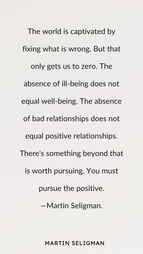|
Whether you struggle with low self-esteem or want to improve your relationships and/or leadership style, knowing your character strengths and becoming familiar with strength-based tools will be the greatest tools you can add to your life tool box. Here are some ways to find your strengths and live life with purpose!  What is Strengths-Based Psychology? Strengths-based psychology is an approach to psychology that sees people as more than just a set of problems to be fixed. Rather, it focuses on what can be done to help people become their best selves, both in terms of relating to others and being productive. A great assessment you can take to learn more about your character strenghts is the VIA Character Strengths Survey. There, you will get to know what your top 5 Character Strengths are. Next, explore how these strengths might manifest themselves in your life. What would happen if you put more effort into using your natural talents? Would it have any effect on the people around you? Use daily gratitude practice to also reflect on your day in terms of what character strengths you have used. Maybe you had to negiotiate something or compromise. In this sitiuation you might have shown empathy, social intelligence and communication skills. Or maybe you cooked dinner for friends or family, in which case you could have used your kindness, generosity and creativity. See, it's that easy. How strengths-based approaches can combat negativity bias I have a theory. What we focus on the most influences our neural pathways. The more we work in a certain way, the harder it is to deviate away from that. Therapists and coaches with an attitude as the one above are not only making it harder to let go of the negative, but can unintentionally prevent their clients from moving into a place of flourishing. It is a self-feeding negativity loop. Let's look at what happens when you add an awareness of character strengths into your everyday life: You learn to identify your wins easier. Your brain has plasticity, you are training your brain to identify not only your own, but other people's strengths. By doing that you are enhancing the strength of gratitude and appreciation. As a result your relationships become more positive, deeper and more meaningful. You experience what we call “Positivity Resonance”, a positive bonding experience. As a result your self-esteem grows. It's an endless upward spiral into florishing. And yet, so many practitioners refuse to incorporate this into their work. You might be saying:"But I don't want to run around with rose-tinted glasses!" Don't worry, your brain has an inbuilt negativity bias to protect your from harm. All that positive approaches do is to shift your perception and vision into “reality”. You see the whole spectrum, not just the negative. It's like getting a new pair of glasses but for your life. Why people get stuck in therapy Let me share an experience I had a few weeks ago during a training weekend for a course I am currently taking: One of the tasks we have been given is to do a 20-minute presentation on a topic we feel passionate about. We are asked to suggest topics and then the whole group would vote on what presentations to take further. A majority of the topics were on, yes, you guessed it, problems and difficulties. I suggested positive psychology. There was zero reaction and zero interest from fellow psychotherapists. To me, this is a disappointment, but no surprise. Therapists can also get stuck in a negativity bias loop. In humanistic therapies Positive Psychology can often be perceived as a fad and “not deep enough”. The vast amounts of scientific evidence are being discounted. The majority of my clients are people who have been stuck in therapy but want to give it one more final try. They often report that their therapist kept looking backwards instead of towards a better future. They have gained more awareness in therapy but still don't know how to move forward. When they mentioned that they don't want to look into the past anymore, the therapist would see that as a defence and make that the focus of the session. It's time to work differently. Fixing a problem is not automatically creating something good. Strengths-based leadership today I don't usually bring politics into my emails, but here we have a perfect example of great leadership. One of the most inspiring leaders of today is Volodymyr Zelenskyy. His resolve, defiance and resilience is not just inspiring and moving the Ukrainian people, but it is also touching the entire world. How does he do that? Yes, we feel empathy seeing the pictures of destruction. People fleeing and seeking refuge. But there is another aspect that touches us: People are being seen and heard. Zelenskyy keeps reminding not only his people but other world leaders and their citizens of their humanity, their character and their strengths. He talks of loyalty, humanity, faith, trust, bravery, perseverance, love, kindness, fairness, leadership, gratitude, hope and even brings in humor in the darkest of times. He sees and appreciates the support he gets and asks for what he and his people need whilst at the same time not being afraid to also critize without hate. This is why we identify. And this is why we are so moved to show support, civilians take up arms and build defenses, people take refugees into their homes. If a country's leader can do all that, imagine what you can do. A litte exercise for you to do with a friend
Get together with a friend or your partner and each share for one minute a story of when you were at your best. Try to listen to what strengths the other has exhibited and note them down. After each of you has shared their story, read to eachother the strengths you have identified and evidence them by pointing to the story. Reflect on how this made you feel. Did you feel seen? Did you feel appreciated? Did it feel good to focus on the positives of your friend or partner?
0 Comments
 "Do not celebrate your success" This is not a statement I am making, but it is a “correct” answer in an exam for a meditation course that I participated in. It is run by a yoga school. I call these kind of statements spiritual gaslighting. Let me tell you why celebrating your success is so important… In my 13 years of working in mental health and coaching I have seen many people embarrassed of talking about their wins and successes. When I ask about their strengths they would often blush, their body language would change inward. You could feel the discomfort in the room. Most of the time it was a fear of seeming big-headed or appearing as arrogant. I am not talking here about false humility, but of shame. When this happens I tend to ask about times that were tough, how they overcame them as well as their achievements. Whilst my clients share their stories I look out for signs of strengths they will have used to overcome adversity and note them down on a small whiteboard in front of me, away from my clients' sight. At the end I turn around the whiteboard and show my clients what I have identified. Maybe you can imagine the shock on many faces. When I explain each strength I have spotted, I give an example from what they have told me that proves that this is not some “let's make you feel better” exercise, but instead an honest positive representation of themselves. Those are some of the most beautiful moments in our sessions. Seeing someone else realize their worth right in front of you and transforming their self-esteem is priceless. So why is it so difficult to celebrate? Many of us tend to focus so much on the daily hustle and bustle and struggle to keep our heads down that we forget to celebrate the successes that we and others have achieved at work and in our private lives. Coupled with pseudo-spiritual statements as the above we are more likely to neglect celebrations. Many of us have never been taught to spot good character traits and strengths in ourelves or others. The effect: you start seeing your achievements negatively. If you focus on what you have not achieved and not on what you are doing, you are less likely to stick to the task and achieve your goals. By not noticing or downplaying your success, you tell yourself that you are doing nothing to be proud of and that you do not deserve to be celebrated. When we celebrate success, no matter how small a win is, we cultivate your success mentality. By telling yourself that success means success, you also succeed at building up your self-confidence and attitude to success. There is a reason why it feels so good when we celebrate success, and it has to do with the neuro-happy chemicals in our brains. Dopamine is released into our brain when we expect to achieve something, and when we achieve it, it feels good, and we want more of it. This way you can condition yourself to seek out that experience again, potentially gaining momentum in productivity and growth. Taking time to celebrate, not just your own successes, but also the ones of others can elevate your levels of oxytocin and endorphins, increase serotonin and lower cortisol which is responsible for stress. You also experience more moments of positivity resonance with the people around you. These are moments of positive connection that strengthens your bond. How to celebrate if you are not used to it or if you feel shame about it? Don’t wait for big wins that we have been conditioned to see as the only worthy ones of celebrating. Start celebrating small wins. Those small wins have a ripple effect. Here are six ways you can start celebrating today:
Once you are used to celebrating feel free to be more open about your wins and successes. Yes, you might experience envy here and there, but most people around you will join you in your celebration. You might even inspire others to aim for the same goals or to celebrate their own individual wins and successes. Remember, whatever we do has a ripple effect. Just as much as teaching people that celebrating is not healthy can shut people down, sharing your joy and celebrating can teach people to experience healthy pride, increase their sense of self-confidence and bring people closer to each other. All starting off with one little celebration. |
Archives
February 2023
Categories
All
|
Statement of Ethical Practice
I conduct myself personally and professionally according to the highest standards of honesty and integrity and always hold the best interests of my clients as paramount and in strict confidence. I continuously strive for excellence in our coaching relationship and do not more outside the limits of my knowledge and expertise. I am a member of the International Coach Federation and abide by their Code of Ethics.
I conduct myself personally and professionally according to the highest standards of honesty and integrity and always hold the best interests of my clients as paramount and in strict confidence. I continuously strive for excellence in our coaching relationship and do not more outside the limits of my knowledge and expertise. I am a member of the International Coach Federation and abide by their Code of Ethics.

 RSS Feed
RSS Feed




